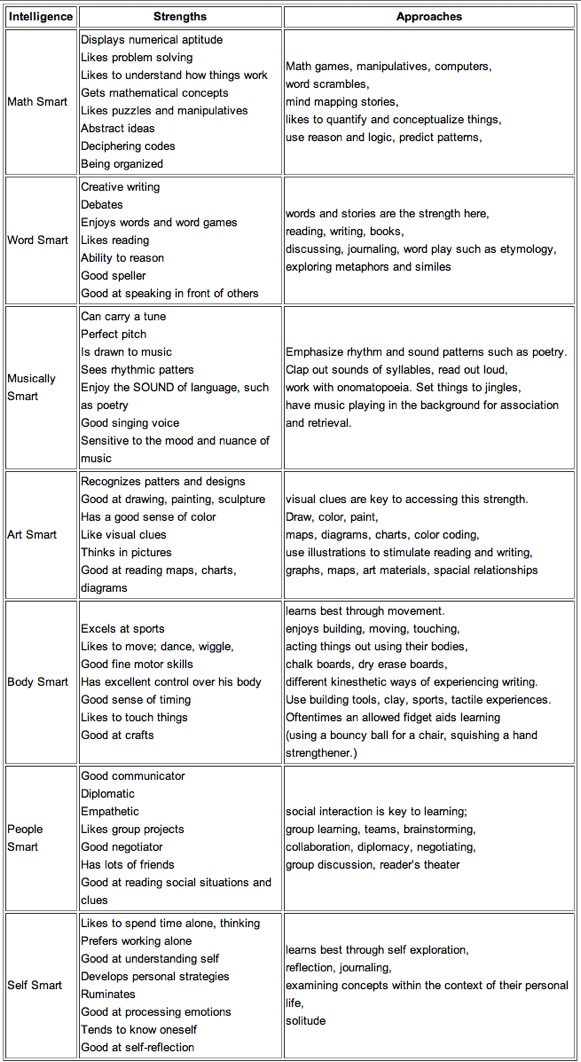
-
1Word Smart (linguistic intelligence)
-
2Math Smart (numerical/reasoning/logic intelligence)
-
3Physically Smart (kinesthetic intelligence)
-
4Music Smart (musical intelligence)
-
5People Smart (interpersonal intelligence)
-
6Self Smart (intrapersonal intelligence)
-
7Visually Smart (Spatial intelligence)
But kids aren’t the only ones relieved to hear of these different forms of intelligences. For any parent of a kid who’s struggled in school, learning of the seven different intelligences can be like stumbling upon a life raft.
The thing is, if your child is gifted linguistically or with mathematical intelligence, then he fits pretty well within the easily measured academic ‘norm’ and has a place within our current educational system in which he can succeed.
But other kids, kids who are smart in different ways, often have their very real talents overlooked or ignored by the very system that should be finding ways to engage that form of intelligence.
The really cool thing about these multiple intelligences is that they are like having seven different keys to learning. Depending on a child’s given strengths, that strength can then be used to as a gateway into making other subjects more easily understood and mastered.
More importantly, as a parent, understanding your child’s strongest intelligence can be instrumental in helping him succeed not only in school, but in life. When we know our kid’s intelligence preferences, we can help them use that knowledge and transfer it to concepts that are outside his comfort zone.
I first learned of multiple intelligences when attending a parent-child school coop that included parent education as part of its core mission. These multiple intelligences were first developed by Dr. Howard Gardner in 1983. Gardner was a professor of education at Harvard University and his theory proposed a whole host of intelligences, many of which were not measured on standard I.Q. tests or even recognized by the educational community.
These different intelligences are unique ways of seeing and perceiving the world and are strengths that are under-recognized by many standard teaching approaches. As I explain to the kids when I talk about writing, they don’t just have to be word smart to be good at writing. Whatever kind of smart they are, it can be used to make them a better writer.
Musically smart people might create sound tracks for their favorite stories. Those who are math smart might be exceptionally good at plotting and story structure. Kinesthetic learners might act out the actions in their stories, or write about physical activities they have experienced. Those who are people smart are probably very good at understanding relationship dynamics, which can be used to make the story richer. Spatial learners might enjoy making a collage to illustrate their story, or even just close their eyes and let the story idea play out like a movie in their head. People who are self smart bring that uncanny self knowledge to the character’s they create.
Below is a list of the seven intelligences, their strengths, and how those strengths can be expanded into other subjects.
So, what kind of smart are you? Your kids? If you’re not sure, here are some online assessments you can take.
http://literacyworks.org/mi/intro/index.html
http://www.berghuis.co.nz/abiator/lsi/mi_test.html
http://homepage.tinet.ie/~seaghan/play/mi.htm
For a much more in depth understanding of these concepts, Multiple Intelligence Institute offers an online multiple intelligence introductory course for parents.





